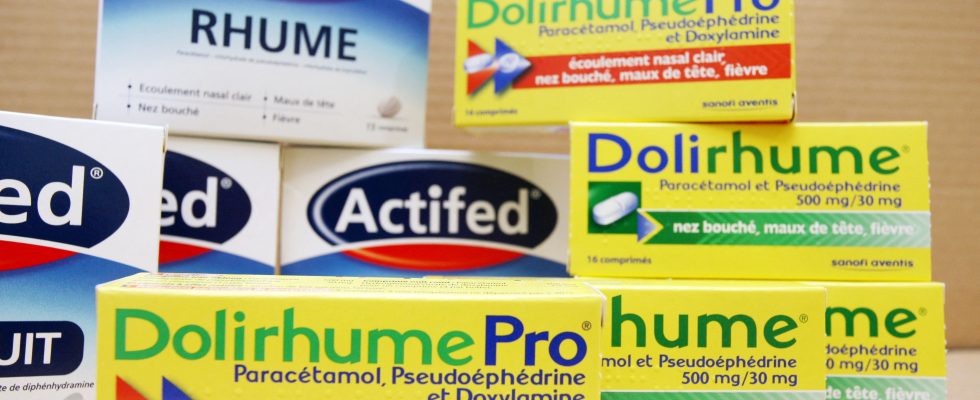A pill, and goodbye stuffy nose, noisy breathing and incessant sniffles? Since Monday, October 23, the National Medicines Safety Agency (ANSM) “recommends” against taking pseudoephedrine in the event of a cold. Cases of encephalopathy and cerebral vasoconstriction have recently been detected in people who have consumed these tablets available over the counter, and widely consumed in Europe.
These serious neurological damage could thus be added to the very long list of adverse effects of this molecule which is found in Humex, Dolirhume or even Actifed, and which unblocks the nose in a few minutes. Seized in February 2023 by the ANSM, the European Medicines Agency (EMA) must check whether this type of symptom has also been detected in other European countries. The institution, which has the last word in Europe, plans to deliver its conclusions in November.
Pseudoephedrine-based drugs are regularly criticized because they are likely to cause many rare but serious side effects, which can occur from any dose: heart attacks, strokes, as well as headaches, abdominal pain , hypertension, arrhythmia, convulsions, hallucinations… So many symptoms much more severe than those of the common cold, which heals on its own within a week.
Known toxicity
For more than twenty years, reports establishing the toxicity of pseudoephedrine and speaking out in favor of restricting access to this molecule have been piling up, without the situation changing. “The benefits are zero, the risks are major, there is no justification for keeping these products on the market, and we have known this for a long time,” notes Jean-Louis Montastruc, professor emeritus of clinical pharmacology at the Faculty of Medicine of Toulouse, and member of the Academy of Medicine.
The harmful effects of pseudoephedrine have been known since the 1980s: by reducing the size of blood vessels, it frees up space in the nose, but also disrupts the entire nervous and vascular system. The molecule has been banned for pregnant or breastfeeding women and children under 15 years old. The fact remains that according to industry figures, millions of French people still consume it every winter for self-medication, even though effective alternatives exist, such as seawater sprays.
The two new adverse effects identified raise questions about the terms of sale of pseudoephedrine, which many specialists would like to limit or ban. Since 2001, the pharmacovigilance centers, responsible for monitoring medications in France, have received each year numerous reports of neurological and cardiovascular incidents that can be attributed to this mechanism, mainly during misuse: non-compliance with contraindications, ingestion too high doses… Between 2012 and 2018, around 307 serious incidents were reported.
Repeated requests to restrict access
Thus, in 2012, the National Pharmacovigilance Commission, the assembly which represents the pharmacovigilance centers at the ANSM, recommended the prescription of pseudoephedrine. A recommendation repeated in 2019 in a new report, but never adopted: the French medicine policeman passes the buck to his European counterpart while strengthening prevention for pharmacists and the general public. Two plans were launched, one in 2013 and the second in 2019. Enough to divide sales by five, without the incident reports fading.
A sign of a milestone reached in awareness of the risks surrounding pseudoephedrine, a large part of the medical profession has joined the ANSM communication published this Monday. The College of General Medicine, the National Professional Council of ENTs, as well as the National Order of Pharmacists and community pharmacists’ unions have joined this message of dissuasion, issued as these seasonal infections regain ground.
A victory for pseudoephedrine whistleblowers. “This is progress, we hope that the European agency will move in this direction,” argues Séverine Carré-Pétraud, editorial director of the magazine Prescribe, who helped reveal the Mediator scandal. The journal, which is aimed at doctors, has been calling for the withdrawal of these molecules since 2007. Pending the verdict of the European Agency, the French authority does not exclude “other restrictive measures to protect patients”.
“A prescription would kill these molecules”
For the moment, there is no indication that pseudoephedrine will be banned, or put on prescription. “The pharmaceutical industry is pushing hard to keep these products over the counter. Putting them on prescription would kill these molecules, because they would only be prescribed in very rare circumstances,” estimates Jean-Paul Giroud, pharmacologist and former colleague of the Agency. French pharmaceutical company, convinced like a large part of the medical profession that the molecule causes more harm than good for a cold.
Among the laboratories that market these cold pills are, in addition to foreign giants like Pfizer or Johnson & Johnson, the French Sanofi or Urgo. Companies that provide a lot of jobs and tax revenue, underlines Jean-Paul Giroud. The manufacturer Upsa, the last French on the list, took the lead, removing the molecule from its “Fervex”, its flagship range, in 2017. That year, a law came into effect to ban advertising of pseudoephedrine.
Although the harmful effects of vasoconstrictors such as pseudoephedrine are no longer in doubt, it is difficult to prove that a symptom in a particular person is indeed due to taking a pill. An argument exploited by the pharmaceutical industry: “Among the 18 cases identified [NDLR : d’encéphalopathies et de vasoconstrictions cérébrales, les deux nouveaux effets indésirables pointés par l’ANSM]two can be directly associated with the molecule” announced Nères, the federation of manufacturers of over-the-counter pills, in a press release published Monday, protesting the position taken by the ANSM, while the Agency European Union has not delivered its verdict.
Conversely, it is also possible that the rare side effects of pseudoephedrine are underestimated: “Who would blame their cold pill, after having had a stroke? People are poorly informed”, squeaks pharmacologist Jean-Paul Giroud. To reduce the risks, the ANSM recommends sticking to humidifying the nose, sleeping with your head raised, and at a cool temperature, around 19°C. And to be patient. It’s better to have a slightly blocked nose than to risk a heart attack.
